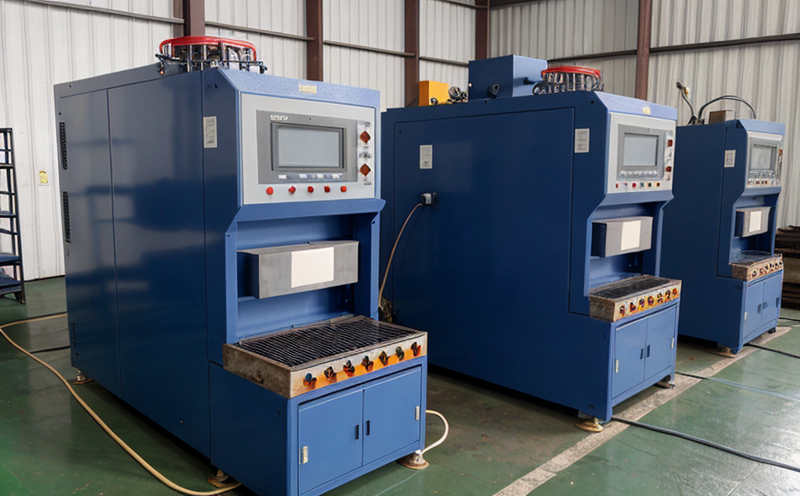JIS G1226 Sulfur in Raw Iron Materials Testing
The JIS G1226 standard is an important benchmark for measuring sulfur content in raw iron materials. This testing process ensures that the sulfur levels comply with international standards, which is crucial for the quality and performance of finished steel products.
Iron sulfides can significantly affect the properties of iron-based alloys during processing. They may lead to hot shortness, a phenomenon where metal becomes brittle at high temperatures, reducing its ductility and toughness. This can cause serious issues in industrial manufacturing processes, especially when dealing with high-stress applications like structural components or machinery parts.
Accordingly, testing sulfur content is essential for ensuring the quality of raw materials before they enter production lines. By adhering to JIS G1226 specifications, manufacturers can prevent costly defects and ensure product reliability across various sectors including automotive, aerospace, construction, and general manufacturing.
The procedure involves precise sample preparation followed by analysis using spectroscopic methods or gravimetric techniques. Typically, samples are carefully weighed and then heated under controlled conditions to release sulfur as a gas or liquid phase for measurement. Compliance with JIS G1226 helps ensure that the raw materials meet stringent quality standards necessary for downstream processing.
Understanding these nuances allows us at Eurolab to offer accurate and reliable results, ensuring our clients’ compliance with international regulations while providing valuable insights into their supply chain processes.
- Precision: Utilizing state-of-the-art analytical equipment guarantees precise sulfur content measurements.
- Consistency: Our experienced technicians apply consistent methods throughout the testing process to maintain accuracy and reliability.
Applied Standards
The JIS G1226 standard is widely recognized for its stringent requirements regarding sulfur content in raw iron materials. This standard serves as a critical reference point ensuring that the materials meet specific quality criteria, thus facilitating seamless integration into manufacturing processes.
When selecting appropriate standards for testing purposes, it's important to consider factors such as industry-specific needs and geographical location. For instance, JIS G1226 is particularly relevant in Japan where strict adherence to these guidelines ensures consistent product quality across manufacturers.
Incorporating JIS G1226 into your quality assurance protocols provides several benefits including enhanced traceability, improved process control, and greater confidence in meeting regulatory requirements. By leveraging this standard, companies can demonstrate their commitment to maintaining high standards of raw material integrity, thereby building trust with customers and stakeholders.
Eurolab Advantages
At Eurolab, we pride ourselves on delivering superior quality testing services that meet the highest industry standards. Our team of experts utilizes advanced instrumentation and meticulous procedures to ensure accurate results every time.
- Expertise: Leveraging years of experience in materials science, our technicians are well-versed in interpreting complex analytical data.
- Innovation: We continuously invest in cutting-edge technology to stay ahead of emerging trends and challenges within the field.
We understand that timely delivery is crucial for maintaining smooth operations. That's why we offer expedited turnaround times without compromising on precision or accuracy.
Beyond just testing, Eurolab also provides comprehensive consulting services aimed at helping clients optimize their quality assurance programs. From initial consultation to post-test recommendations, our goal is to support you every step of the way towards achieving optimal performance in your operations.
Why Choose This Test
- Accurate Measurements: Using sophisticated analytical techniques allows for precise determination of sulfur content, ensuring reliable data.
- Comprehensive Reporting: Extensive documentation provides clear insights into the testing process and results, facilitating informed decision-making.
- Regulatory Compliance: Ensures adherence to international standards like JIS G1226, thereby supporting global trade activities.
The importance of accurate sulfur content measurement cannot be overstated. Sulfur impurities can severely impact the mechanical properties and weldability of steel, leading to potential failures in critical applications. By choosing this test, you guarantee that your raw iron materials are free from such undesirable elements, safeguarding both product integrity and operational safety.
Moreover, compliance with JIS G1226 enhances your company's reputation by demonstrating a commitment to excellence in quality assurance practices. This can translate into increased customer satisfaction and stronger market positions.





